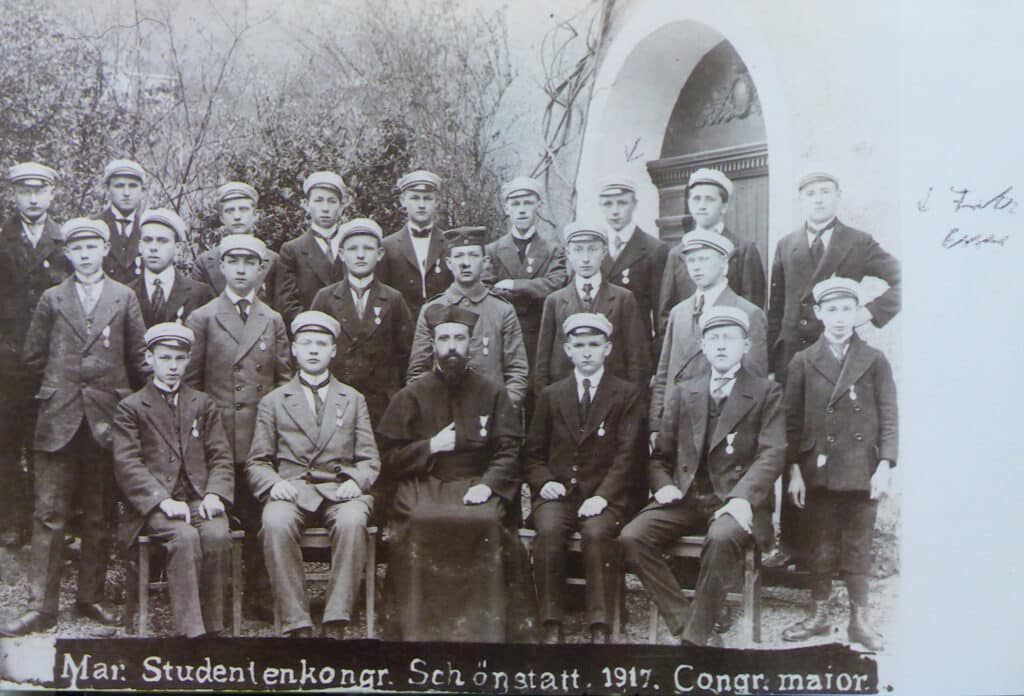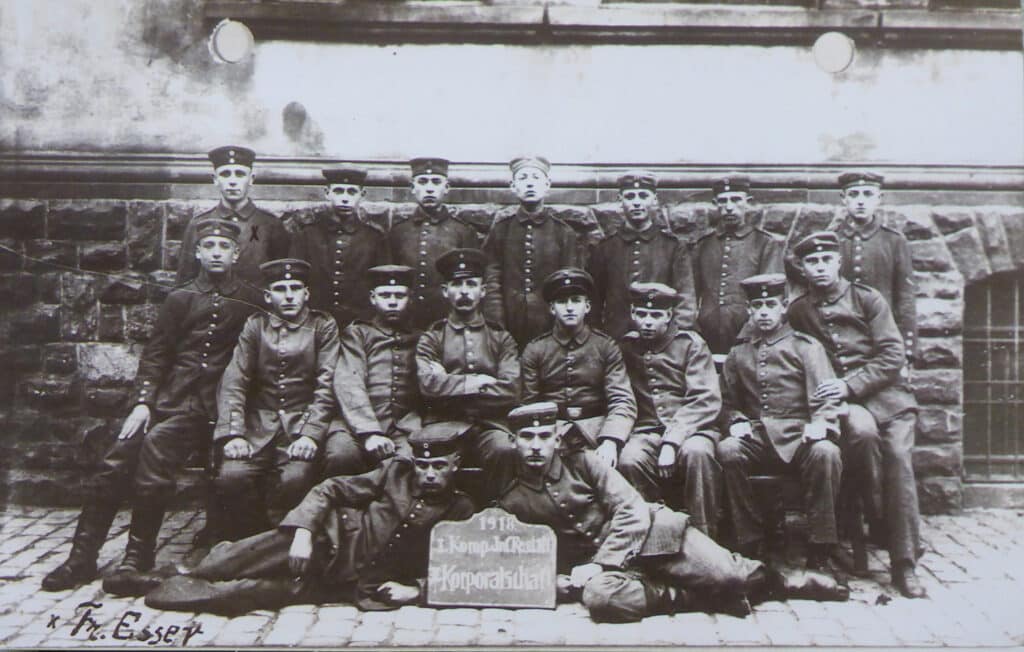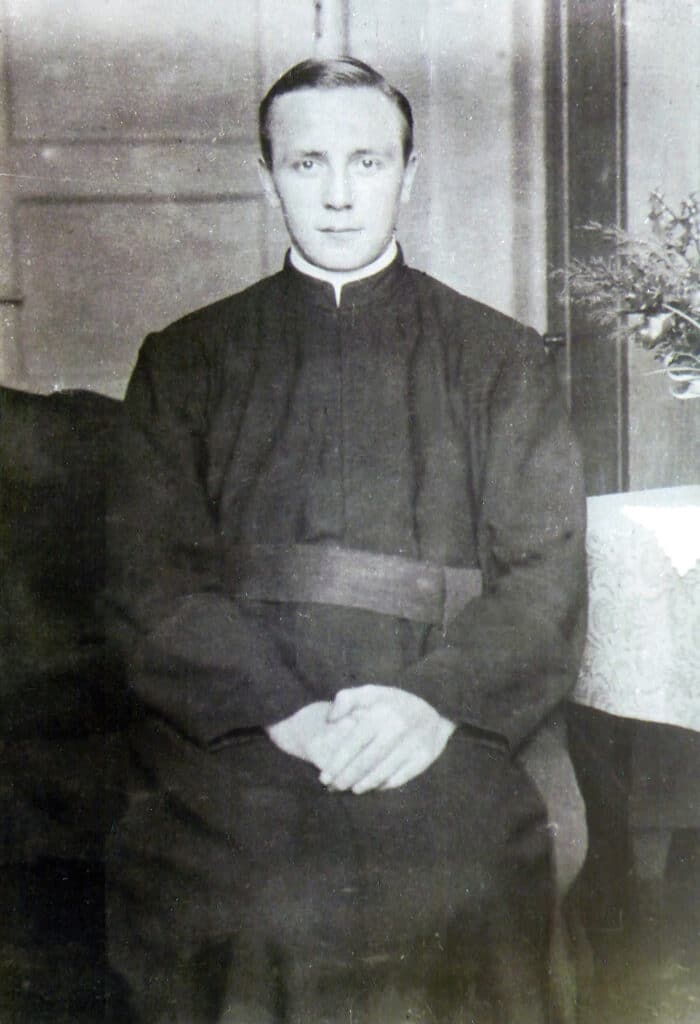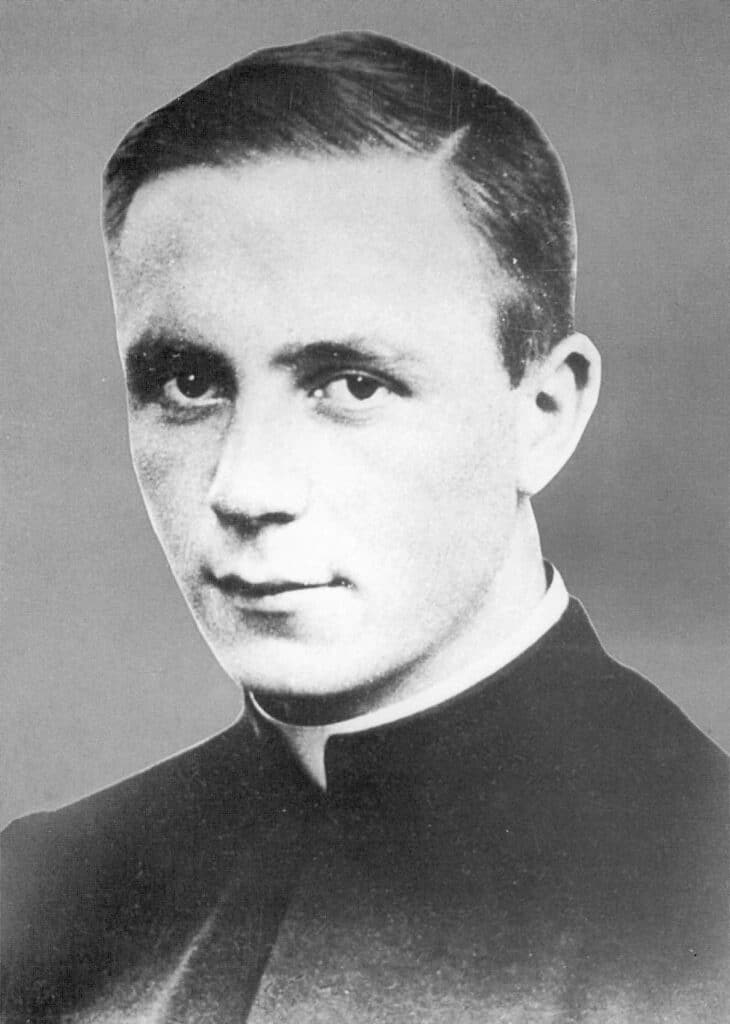In his apostolic exhortation Evangelii Gaudium, Pope Francis speaks of the anointed oil of mercy that all people should experience “as a sign of the kingdom of God which is already present among us” (EG 288). Yes, there were and are many wounds to anoint, both physical and spiritual, then as now. And this is the task of all Christians, but especially that of the ministers anointed at their ordination.
And if I now invite you to dive into the history of Schoenstatt’s founding, I would like to introduce you to a young man of the first generation who is hardly known, Fritz Esser. – Although every visitor to a Schoenstatt chapel is aware of his work because Fritz has been immortalized forever in the frame of light around the picture of Mary: Servus Mariae nunquam peribit = A servant of Mary shall never perish. At the age of 18, he thus gave his life an appropriate title. This is how it came about…
A close friend of Joseph Engling
On September 23, 1912, Fritz Esser arrived at the house of studies in Schoenstatt, about two months before his 12th birthday. The next day his future study mate, Joseph Engling, arrived. He was 2 years and 10 ½ months older than him. Despite their differences, they later became friends. They both wanted to become priests.
Joseph quickly becomes one of the top students in the class, while Fritz ranks 36th out of 39 students on his first report card and must fight hard to be promoted at the end of the course. “I’m ten times dumber than I look,” he later confesses.
With his noble, irresistible, and cheerful demeanor, Fritz soon wins the affection and appreciation of everyone. It is impossible to get angry with him. Together with Joseph Engling, he grew up in the Marian House Congregation in the emerging Schoenstatt and became actively involved.

Fritz found a fatherly heart
But as is the case, a sanguine temperament also has its dark side:
“Exultant unto heaven, sorrowful unto death, only the soul that loves is happy!”. This quote from Goethe gives an insight into the fickleness that affected Fritz Esser when faced with adverse situations. He realized this when he was 17 years old and in the army.
But let’s not go that far yet. – We still have to talk about Father Joseph Kentenich. In October 1912, he took over as spiritual director at the age of 27. As spiritual director, he lived under the same roof as the boys, first in the new house of studies on the hill and then in the valley beginning in 1914, during the war. He was literally “very close”.
Perhaps Father Kentenich recognized something of his own early life in this boy. Fritz had grown up without a father. His father died of tuberculosis before he was one year old. His sickly nature may also have awakened paternal feelings in the Father. – It is said that the spiritual director once “fed” the ailing Fritz in bed.
A collection of Father Kentenich’s letters to Fritz Esser gives an idea of how deeply this remained engraved in Fritz’s soul: “I am secure in the Covenant with the Blessed Mother, and with Father Kentenich, I can experience it over and over again in my own flesh”.
He became Father Kentenich’s “secretary”
Let us go back to 1918, when Fritz Esser was 17 years old and Father Kentenich 32.
After Easter, Fritz was in for a surprise: since they were soon to be called up for military service, the class of 1900 no longer had a school, and he was to go home and stay there! But his mother had been forced to sell his father’s house in the village and was now living alone in the neighboring town, so where to take Fritz? – Father Kentenich found a sack of straw in Schoenstatt and made Fritz his secretary, his scribe. – Is that not the anointed oil of mercy?
War correspondence

At the end of June, Fritz was sent to Mainz to join the 117th infantry reserve. From these mere 5 months, 4 letters from Father to Fritz have been preserved.
– July 4, 1918: What do you think of the glimpse you are gaining into the thoughts and feelings of our people? We priests have a difficult task, don’t you think? Remain convinced that your heavenly Mother wants to educate you so that you will become a useful instrument throughout the course of the war….
– August 22, 1918: Your illness is a kind providence. This way you will be able to work more for your group and concentrate better on yourself…
– September 11, 1918: I am glad that you have made good use of your time…. You will be especially pleased that our little chapel, which you have always taken pains to decorate, was the center of attention during the retreats….
– October 28, 1918: It is a pity that we have not been able to talk privately recently. I would have preferred it to all other conversations. Now you must try to get back to your former path by yourself. You are dissatisfied with yourself. That is the best ground for rekindling the desire to achieve the former ideals….
How much solidarity and encouragement there is in this line “we priests”. Then the awakening. I call it the anointing oil of gratitude.

Father Kentenich’s advice always helped him
The war came to an end, and after the Christmas vacations of 1919, a new life began.
Fritz Esser became deathly ill, his lungs were diseased. Sometimes he lost consciousness. In one of his brightest moments, his spiritual director visits him. “Reverend, am I going to die, or should I pray for health?”. You should pray for health. – Fritz does, and after a few days the illness subsides.
But then, high school in the summer, how is Fritz supposed to make it? He finds himself in a real existential crisis. In desperation, he turns to Father Kentenich, shouldn’t he give up his studies, renounce the priesthood and join the Pallottine Brothers? Father encouraged him repeatedly and directed him to the Covenant of Love. His confidence became heroic, a childlike confidence arose from it, and this brought inner balance to Fritz.
Perhaps Father Kentenich told him: “Do something for the Blessed Mother and she will take care of you! – Because of profound trust, Fritz wanted to erect a monument to the Blessed Mother and planned a wooden light frame around her image of grace! Soon he found the four Latin words. With his skilled hands, he cuts out many individual pieces and glues the whole structure together. The Pallottine Brothers organize the electrical installation and the work succeeds: Servus Mariae nunquam peribit.

He was anointed with the oil of sanctity
For Fritz Esser, the preparation for the Abitur (the German final exam at the end of secondary school) with the spiritual guidance of Father Kentenich became a natural and supernatural highlight of his life. “I know I can’t do anything, so I trust even more in my heavenly mother and in dear God.”
The oral examination was on July 25, 1919. “Now I can confidently put the books aside, for I have passed the examination…. I was always the worst in my class…”.
Without realizing it, Fritz lived this half year heroically and confidently very close to God and Our Lady. – In the following years, Fritz “hit bottom” from time to time and also climbed back up a bit; when he died, he was again at the top.
Fritz Esser is granted another 3.5 years of life. He entered the Pallottine novitiate in Limburg. But he soon had to leave because his lungs did not heal. On January 4, 1921, his journey took him to Sandbach, near Neustadt/Odenwald, and finally to the Hildegardis Hospital in Mainz. Looking back, he remembers with longing the wonderful time he spent preparing during his secondary school years. He was anointed with the oil of sanctity.
Sources:
Josef Klein: Fritz Esser, series Schoenstatt Lived No. 4, Schoenstatt 1954.
Father’s Care in Letters, Novena with Fritz Esser, Rodgau-Weiskirchen 1995
